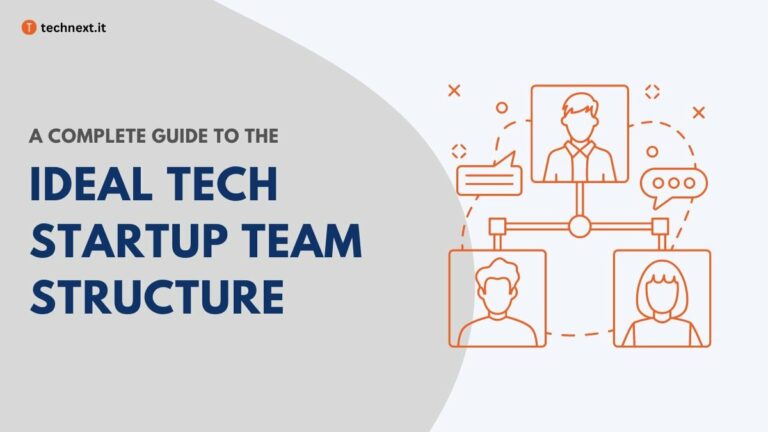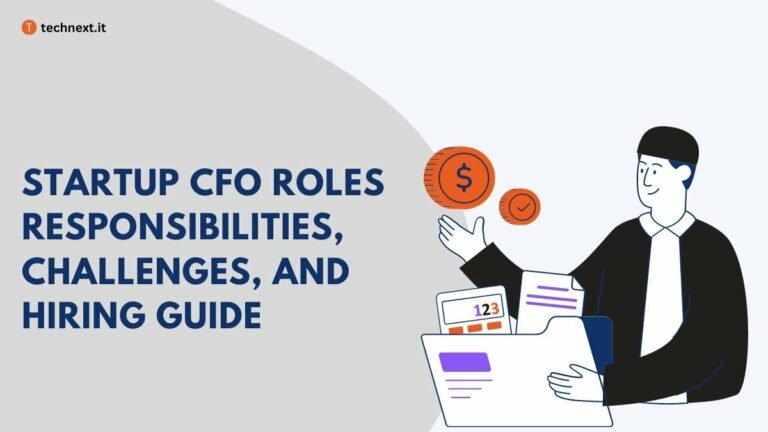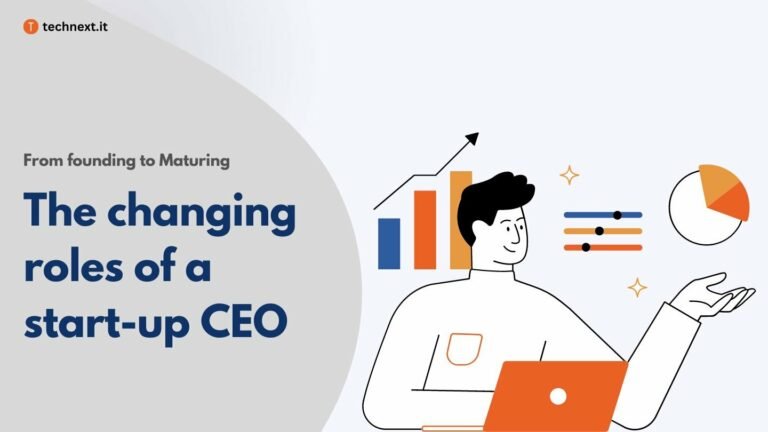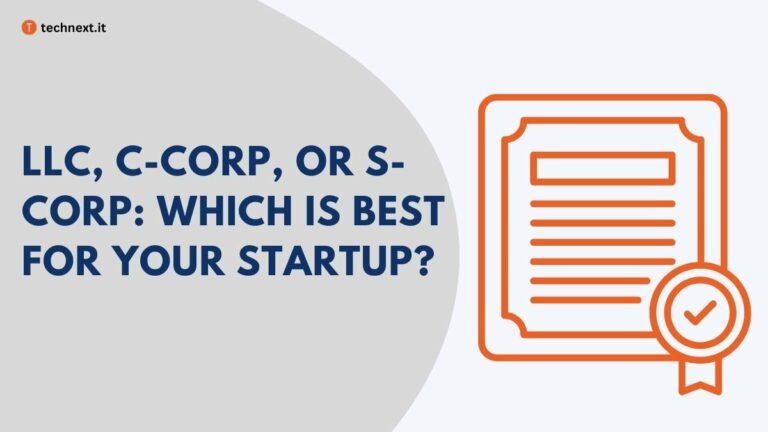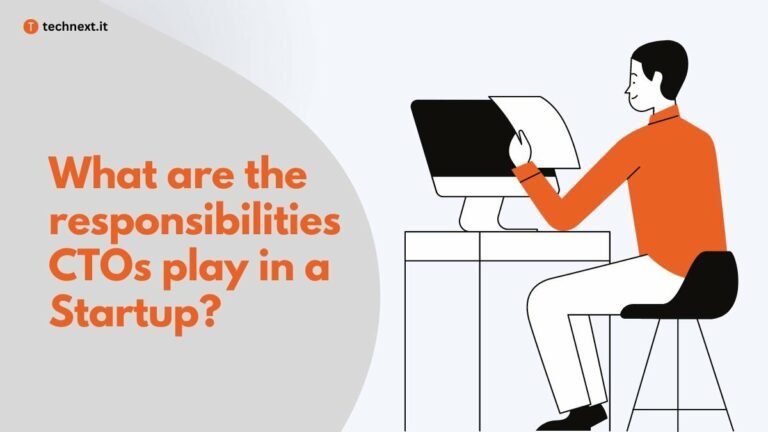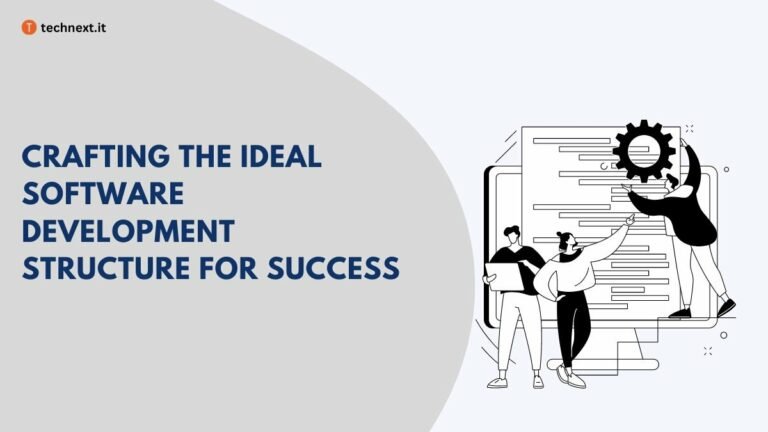How to Hire Developers for Startup (A Definitive Guide)
This article will discuss every factor affecting the hiring process and provide a step-by-step guideline on how to hire developers for a startup so that an entrepreneur can minimize the challenges and mitigate problems of the initial stage.

Have you ever wondered why most successful CEOs don’t start their own startup? That’s because starting a startup is like entering a hornet’s nest that even most experienced executives dare not venture into.
In reality, founders have a very stressful life under all the glamour and glory they get. The stress comes from thousands of challenges they face on the way to success, from managing the funding to hiring developers to development to marketing. And that’s without considering that they have a 90% chance of failure.
Yet, there’s a silver lining to venturing into this rough terrain. A founder gets the chance to make his dream project real. While it’s nearly impossible to eliminate all the challenges, entrepreneurs can reduce the pressure significantly if they make the right choices in building their team and hiring team members.
Finding and hiring developers & programmers is the hardest among all things startups need at their initial stage. Let’s discuss how you can hire the right devs for your startup.
Startup Challenges That Hiring the Right Developers Can Minimize
Every company founder understands that there will be challenges from the start. But problems can still catch you off guard, whether because you didn’t expect them or you’re unclear about how to respond. Having a few extra pairs of eyes can help founders solve startup problems. Here are some significant issues that the right developers can help minimize.

1. Lack of Planning
It’s incredible how many businesses fail because they “forgot” to plan. Or perhaps they did plan but didn’t cover all the bases. Key areas like development, staffing, skills shortage etc., aren’t afterthoughts. They should all be included in the founder’s business plan. When you have hired the right developers for new business, they can help you to figure these staff out with their professional skills. Even when events take an unexpected turn, these startup developers can help you with their problem-solving skills.
2. Challenge of Time Management
Like life, there is never enough time for anything. In startups, many tasks need to be finished, and if you are not familiar with prioritizing tasks, you will face time management issues. If you can hire the right developers for your startup, they can help you. Developers are efficient in time management as they are used to working on different projects all the time. They use different tools to manage their time and prioritize their work. You can take developers’ expert advice and tools when it comes to the time management of your startups.
3. Cyber Security Threat
Startups are frequently targeted for cyberattacks because they typically have fewer resources to defend themselves than larger corporations. When you hire the right developers, they can pay extra attention to your startup’s data safety. This will keep your data safe and increase the startup’s revenues and good reputation. So be careful while hiring a developer for a startup.
4. Finding the Right Developer in the Future
In the future, when your team grows, it will be essential to hire the right developers to keep up your company’s growth. The developers you hired as a startup have the experience and expertise to pick the right developer for your company, and they can also give you some tips for hiring a software developer.
5. Management Challanges
The last thing you expect from a developer is help with administration. However, they often provide an “out-of-the-box solution” to a problem that none of their executives thought of. Their tool-first approach often helps them find the most straightforward solution, saving lots of time and money. Therefore, find and hire startup programmers with time and caution.
“Time spent on hiring is time well spent.”
– Robert Half, Founder of global human resource consulting firm Robert Half International
Why It’s Hard to Find Good Developers or Programmers for Startup
Yes, the right people can make the founder’s journey easier but hiring the right developers is no less challenging. Hiring developers for a startup is one of the biggest challenges of all. It is still as hard as it was at the beginning of the internet era. Let’s discuss why it’s so hard to find programmers, even in 2022.
Before we discuss how to find developers, we want to point out the challenges of hiring good developers for startups.

1. A Competitive Rivalry With Other Businesses
Each organization seeks top talent. With outstanding talent rare, companies compete intensely. Add digital giants like Google and Microsoft to the mix, and it’s difficult for smaller enterprises or startups to make exceptional hires. Keep reading this article. You will find out how you can make outstanding hiring like senior developer or CTO for your startup.
2. Unreliable Applicants
Hiring for a startup can be a risky business. You may offer the job to someone who doesn’t honest or devoted to working, or they might use your company as an opportunity against better offers from other places- so make sure you’re careful! You can’t waste resources because, in a startup, every penny counts and resources must go into development.
3. Not Having The Ability To Evaluate
Lack of tech expertise among existing team members is another common and overlooked tech hiring obstacle. A lack of tech knowledge typically lowers the criteria when evaluating developers. For startups, poor hiring leads to higher opportunity costs.
4. High Wages
Candidates expect a significant pay increase when joining a new company. Many startups struggle to pay the high wages requested by developers. Even with outside backing, they lack the financial muscle to compete with larger corporations with greater budgets.
5. The Brand’s Reputation
Another tech employment difficulty that many startups face is the ’employer brand.’ When starting, most businesses understandably lack the requisite PR and recognition. Candidates are more likely to choose a tech giant over you if they don’t know what your company does, even if you can offer better terms and more exciting employment.
There will always be challenges, but we all know most obstacles are overcomeable. You can minimize these challenges by preparing beforehand.
Before You Start Hiring for Your Startup
Here is detailed advice on how to get ready before you begin hiring for your startup.

1. Finalize Your Product Idea & Business Plan
Your startup success largely depends on the product idea you have. The idea and plan also define how one should build the product and which platform to use. Different types of development require different types of experts. Before hiring programmers for a startup, make sure you have validated your plan using proper methods and planned all your list of requirements and business plans. It’ll give you a better idea of hiring the right developers for your new business.
2. Understand Your Budget
Startup hiring is difficult. When you have few resources, it’s even harder. Make sure you are always paying attention to the budget. You want to hire vetted developers, but they may not work for a startup without rewards. They’re also costly. If so, consider outsourcing or remote hiring, which has helped numerous tech startups while hiring developers. You can cover all benefits for offshore developers within your budget.
3. Define How Your Team Should Function
Now that you have finalized your product, business plan and your budget, it’s time to assemble a team. While hiring developers for a startup, you should be careful when choosing the team.
a) Onsite Development Team
Onsite developers can work from the office, usually alongside their own development team. Easier to get involved in team discussions or learn any skill. It will be simpler for the team to work together and understand how everyone works. Working together is very important for startup developers.
b) Remote Development Team
The other type of team is Remote Development Team. Outsourcing some of your development gives you access to a much wider pool of skill sets. The remote development team is more cost-effective and flexible. While you are searching worldwide, it’s easier to find and hire contract developers for startups.
c) Hybride Development Team
Hybrid teams are a great way to get the best of both worlds – having some members onsite and others remote. A company needs programmers for their business plan, so this will help them build up an effective team quickly while still being able to experiment with different ratios before deciding what’s the right fit based on feedback from those involved in building it as well!
4. Finalize Your Hiring Model
Now it’s time to choose a hiring model. Hiring models depend on trial and error, so you must try each one to see what works best for your business. No matter what method you choose, it must fit with your company’s and the employee’s career goals. Let’s discuss some of the popular models.
a) Short-Term Hiring Model
A short-term hiring plan is often projected 6-12 months into the future. You need to consider several options based on your present estimate; how much money can you afford to invest in additional employees? What effect will it have on your runway? This plan does not allow for future growth if you intend to expand in five years. It’s just what you need to meet your sales and growth targets for the coming year.
b) Long-Term Hiring Model
Your long-term hiring model provides direction to grow. What are your company’s plans over the next two to five years?
For example, perhaps you currently sell mainly to SMBs but intend to move upmarket in three years. Perhaps you want to hire some solution engineers, a new CMO, or other individuals to assist you in meeting your objectives.
In your long-term recruiting plan, you can plan for certain hiring decisions. You can set goals inside your strategy to reach to make those hires and justify the costs.
c) Contractual Hiring Model
The contract-to-hire hiring model is a temporary job position in which people work for a company for a set length of time before committing to full-time employment. After the contractual period expires, both you and the employee decide whether or not to continue working together in the future.
Contractual positions are common in information technology, such as project management, graphic design, marketing, communications, and administration.
d) Recruitment Process Outsourcing Model
You can outsource hiring from a third-party hiring agency to gain efficiency, scalability, quality, cost, and service benefits. The ideal recruitment firm combines cutting-edge technology, specialized staff, and sound hiring processes for optimal talent development. Among their responsibilities are estimating, sourcing, analyzing, employing, and onboarding individuals utilizing technology, key performance metrics, and expertise.
e) Build-Operate-Transfer Recruitment Model
The Build-Operate-Transfer (BOT) approach is an offshore unit during the ‘build’ stage and putting it through a trial during the ‘operate’ stage. You can supervise the team during the entire process. The team will be managed by an offshore agency, which lowers corporate costs and frees up additional resources for employee upskilling.
If managed well, these models can be proved beneficial for a startup. Technext offers BOT model recruitment, and several startups utilize our offshore development services to grow their business.
After you have finalized your product idea, business plan, and budget And you also have a clear vision of hiring model and team functionality. Now it’s time to start hiring developers for your startup. You can follow four steps on how to hire a developer for a startup.
How To Hire Developers for Startup In 4 Steps
You can follow the following steps to find and hire developers for startups.

Step 1: Understand What to Look for In Developers
There are many skills to look for in a developer, including digital tools and computer systems. Here are some of the hard and soft skills you can look for.
1. Hard Skills
Here are some technical skills you can look at while hiring the right developer for your startup.
a) Strong Command Over Programming Languages
Programming languages are various source codes that can be written for a software application. When you are looking for a developer, you must keep in mind that Software engineers should specialize in at least one coding language.
b) Database Knowledge
Databases are computer systems that enable humans to organize and organise data, especially business records. Software developers must be able to search for information, enter new lines of data in a table format, and update a system with new content.
c) Data Structures and Algorithms
As a software developer, having a solid foundation in data structures and algorithms is important. Data structures provide a way to organize and store data, and algorithms provide the means to manipulate and process that data. Without a solid understanding of these concepts, developing efficient and effective software would be difficult. Furthermore, knowledge of data structures and algorithms can also help to improve problem-solving skills. In short, having a strong understanding of data structures and algorithms is essential for any software developer and the company’s success.
d) Testing Procedures
Before a product can be made available to consumers, it must go through a thorough testing process. It entails the use of a number of digital technologies to verify that a product works as intended and meets the specifications set forth during design.
e) Debugging Knowledge
In the software development process, debugging is used to find and fix bugs in a program’s code. Running a program through special tools to notice each error and then utilizing problem-solving skills to identify which part of a code caused it is the process.
2. Soft Skills
Recently a tweet from Zain Khan got immense traction. “Hard skills get you hired, but soft skills will get you promoted.”
Ever wondered why soft skills help to climb the corporate ladder? Because employees’ soft skills are the key things that push that company forward. So, when hiring a developer, dont even think you only need people with hard skills. Soft skills are as necessary as hard skills, if not more.
a) Critical Thinking and Problem-Solving Abilities
Critical thinking and problem-solving abilities are important skills to have in life. While they are often used interchangeably, there is a difference between the two. Critical thinking refers to the ability to analyze information and make sound judgments. It requires you to put aside your biases and objectively look at the evidence. Problem-solving, on the other hand, is the process of finding a creative solution to a challenge. It involves breaking down a problem into smaller pieces and brainstorming possible solutions.
If someone thinks critically, they will be better able to make informed decisions. On the other hand, a person with strong problem-solving abilities will be able to find creative solutions to the challenges they face.
b) Communication Skills
What a developer says and how they say it can affect how others view them. So developers should be good communicators, whether they work full-time or remotely. Developers must often communicate in writing. Programmers need concise writing skills to communicate clearly. This lets people convey an opinion, thought, or report politely.
c) Culturally Fit
“Being culturally fit” is a quality that hiring managers often underestimate. But in today’s highly globalized world, it’s more important than ever for programmers to be culturally fit. With teams often spanning multiple time zones and countries, everyone must be able to work effectively together. This means being able to understand and empathize with different cultures, as well as being able to communicate effectively.
Being culturally fit also allows programmers to understand the needs of their users better. After all, people from different cultures often have different ways of using technology. By being aware of these differences, programmers can design more user-friendly applications that meet the needs of a wide range of users. In a world that is becoming increasingly connected, being culturally fit is an essential skill for programmers.
d) Time Management
Developers usually have deadlines, sometimes they manage a team or maybe they’re freelancing. All of this demands a developer to possess solid time management abilities. Time-conscious developers can meet deadlines and deliver accurate estimates. Customers want punctuality and deadline adherence. You can only finish jobs and projects by hiring developer with good time management for your startup.
e) Self-Awareness
Developers should be confident in their knowledge and humble in their mistakes.
Their true confidence is knowing where to improve. When developers are aware of their weaknesses, they might seek training and guidance. People who deny knowing anything are usually insecure. If a developer is secure in himself/herself and accepts his/her shortcomings, it shows emotional maturity, which is always useful. Confidence in their knowledge is also crucial. Self-confidence allows people to speak up, make fewer mistakes, and face criticism.
Step 2: Crosschecking Developer’s Skills
As a hiring manager, it’s important to ensure that you bring the right people onto your team. One important step is to crosschecking the developer’s skills. By taking the time to verify that someone has the skills they claim to have, you can be sure that they’ll be able to hit the ground running and contribute to your team’s success. Furthermore, by crosschecking skills you can identify any gaps in someone’s skillset, and determine whether or not additional training may be necessary. Here are five methods for testing developers’ abilities:
a) Analyzing Their Programming Portfolio
Portfolios demonstrate candidates’ development level, career aspirations, talents they want to acquire, etc. You can see their coding skills through personal projects in a portfolio. You can also know how did the candidate incorporate additional libraries or tools. Or do they collaborate etc. Digging through a candidate’s portfolio and source code before an interview might help you develop unique questions for the hiring process.
b) Digging Into Their Github & Stack Overflow Account
GitHub is not a resume, but it helps to hire coders. You can see how they can build readable, maintainable code that others can jump into. Before digging into this code to see how clean, readable, and structured it is, check simple metrics such as the number of followers, The date the candidate joined GitHub, The number of repositories, the number of contributions and relevant keywords for languages and technologies etc.
You can also dig into their stack overflow account to see the candidate’s development knowledge and involvement. Check developers’ Stack Overflow reputation and top replies. Developers with high Stack Overflow reputations actively ask relevant questions and provide helpful replies.
c) Live Coding Test
Live coding test sessions allow interviewers to see in real-time how a candidate performs on their own with merely programming expertise and assess communicative and collaborative skills within a team (in the case of collective interviews). And what questions the candidate asks to grasp the problem before rushing to solve it.
d) Testing Real-World Problem-Solving Skills
Real-world problem-solving skills are an effective approach to hiring the right developers for your startups. You can test candidates’ coding skills objectively and efficiently by having them solve real-world challenges. Try to set up a programming test for developers using CodinGame. They can test applicants in one specific programming language or position or over numerous technologies. Online coding challenges can save you time and ensure technical hires.
e) Final Interview To Access Their Soft Skill
Sometimes, the quality of the code written by a team is more important than how well they work together as a group. In these situations, the ability to communicate effectively is essential. Those with “soft skills” are easy to get along with. Successful employment and cultural fit depend on them. Assessing one’s soft abilities is difficult. You can assess soft skills best through organized interview questions. Combine questions to determine the candidate’s social and interpersonal skills, character traits, and professional attitudes required for the job. Include teamwork, patience, time management, communication, and behavioral and situational questions in your interview.
Step 3: Discuss Developer’s Expectations
Nearly three-quarters of software developers say their workplace standards are too ambiguous, while 33.5 percent say they are too difficult to meet. Poor documentation is another source of displeasure for 34.7 percent of developers. Developers, in general, dislike uncertainty and doubt. While interviewing, clarify the role, the work required, and the expectations. You can make a job more appealing to a developer, and throughout the process, you can also discuss the expectation of the developer.
Step 4: Take the Final Decision
If you’ve followed the stages above, you may choose the finalists without risking a terrible hire; you’ve only moved forward with competent candidates. Your final issue will be choosing which finalist to hire if you have the budget and corporate policy allows it, you might hire more than one. Here are some final pointers to help you make your decision.
Examine Your Scorecards And Notes
Generally, know each candidate’s strengths and limitations. Consider the importance of each talent or quality.
Make A List Of Everything
You can write positives and negatives about each applicant. Side-by-side. Get your team’s input on your lists. Sometimes you’ll know which one you like, but be sure you know why. Be mindful of your biases.
Check References
Request recommendations from your finalists. Usually, prospects will guide you to people who will offer them a positive reference, so make sure you know what questions to ask.
Avoid Self-Doubt And Overthinking
Sometimes you second-guess yourself before making an offer. Am I right? I should have hired the other candidate. Doubt increases as you ponder. That’s useless overthinking.
At the end of the day, if you have been careful throughout the hiring process, you will likely make the right choice. But the process is a little different if you are trying to hire a senior developer or CTO for your startup.
How to Find and Hire Senior Developers (or CTO) When You Have Limited Resources
In today’s competitive business world, there is more global competition for talent on the market. Organizations have difficulty finding great workers with the right skills for different positions and departments. When it comes to startups hiring a senior-level developer or CTO becomes more difficult because of the small team size, unitability, and limited resources. Here is a guide you can follow to save your day.

Find The Developers Who Want To Do Meaningful Work
Not every senior developer desires financial gain. Some developers want to be a part of something bigger than themselves, something meaningful. They are inspired to use their experience and help others to grow. Find this type of senior developer who fits your startup’s requirements and asks them to be your senior developer or CTO.
Impress Them With Your Objective And Work Culture
When you are searching for senior developers or CTO, try to impress them with your objective and work culture. A positive work culture boosts employee engagement and satisfaction and attracts and retains top talent.
Give Them Authority
Senior developers who have worked on various projects better understand how to write maintainable code and systems. A skill they possess is an excellent sense of what initiatives are worth pursuing and how to manage stakeholders’ expectations. While recruiting a senior developer or CTO, you can propose giving authority to them.
Offer Generous Equity Or Partnership Opportunities.
Last but not least, you can offer generous equity or Partnership. You can explain to them how a partnership with them can increase the amount of knowledge, expertise, and resources available to you in order to create better products and reach a larger audience.
Now that you know how you can convenience a senior developer to join your startup. Here are some additional startup tips for hiring a software developer at a startup from a successful startup founder.
Tips for Startups for Finding the Best Programmers and Developers
Every startup owner can be benefited from these tips, but these tips are specially for non-tech founders and founders without management experience who are willing to hire programmers for startups.
Tips for Non-Tech Founders
Check Previous Portfolio
The portfolio is important. It shows strength. You can judge the quality. Of course, they will deliver the same quality or more, but without checking their portfolio, you won’t know what you’re going to get. Especially ask for a portfolio similar to your project.
Check Client Reference
Ask them for the email addresses or phone numbers of their clients. Ask the client about timeliness, deliverability and professionalism. You might ask for the hourly rate, but asking for the whole budget won’t be professional.
Have A Video Chat
Your offshore development team or company should show their faces. You will find out the most important skill if you just do a video chat. You will get an idea about their communication skill, are they late to the meeting; that’s a red flag. Do they understand what you are saying, and can they speak English properly? If not, that’s a yellow flat. A 10 mins video chat will save you some time chatting or hours of email exchanges.
Ask for the Sprint-Wise Breakdown
Software development often breaks down into several sprints. So every sprint has some deliverables with a timeline; ask for that. Show it to some other developers or try to understand if that’s reasonable. This way, you can set your expectation while hiring developers for startups and make the offshore development team accountable in the future.
Ask for the Support Tenure
Ask how long they will provide you with the support. There are always small bugs, fixes and improvements after you release software. So it’s important to know how they back you up later and what’s the cost
Tips for the Founders Who Have No Management Experience
Ask For The Tools They Use For The Project Management
There are many project management tools are available on the market. Jira, Trello, ClickUp, and Notion are a few popular ones. Though many companies still depend on Google spreadsheet for its versatile customization opportunity and ease of use. You can ask the company which tool they use. If they reply with the famous one, you will know that this offshore software company is well-informed and updated.
Ask For The Update Frequency Of The Task
It is imperative to know when you will be updated with their tasks. It could be once a week, once in a month or whatever both parties agree. The best option is daily updates. As your team is away, you should know what they work on daily, what’s their next day’s task and if there’s any blockage. This way, you will be able to avoid friction in the future.
Ask For The Previous Client’s Reference
As already mentioned above, you should get the reference from the team’s previous client. Otherwise, testimonials can be faked, and you could lose your valuable time and money.
Get The Task Breakdown With Timeline
A breakdown of tasks with a proper timeline can be beneficial. Regardless of the total budget and a month-long timeline, you should have a breakdown. It would be wise to break the features in such a way so that when a few chunks of releases are done, you get a working system or a chunk of features that works
Ask For The Point Of Contact And Alternative Contact
Most remote offshore development software companies have project managers and tech leads who oversee the projects. They work side by side with programmers and UI/UX designers. So get connected with them. It will cut your time to communicate via a support person or non-tech guy
“A modern recruiter is one who is targeted, builds relationships and knows how to not only find candidates but also get them to respond!”
– Stacy Donovan Zapar
After You Hired Developers and Build Your Team
So far, we’ve only discussed how to find and hire developers for new startups. It does not end with hiring developers; you must retain them and integrate them into a team. As a good leader, to ensure your team’s success, you can motivate them to keep on track and accomplish company milestones and goals. Meanwhile, you must ensure everyone is satisfied and contributes to the company’s bottom line. Here are some team management strategies.
Direct and open communication is key
Direct and open communication skills ensure task, deadline, and objective clarity for the entire team. This transparency enables a team to concentrate on their efficiency and teamwork.
Provide a clear vision:
Setting a clear vision for projects, teams, and the organization is usually the best way for managers and employees to stay focused.
Motivate your team to work cooperatively
Effective collaboration is essential for teams to complete tasks together on time without dispute.
Carefully assign work
Assign tasks to employees based on their skills, experience, and competency.
Give constructive feedback and acknowledgment.
Constructive feedback sessions help both employees and managers identify areas for improvement. It provides employees with a clear picture of where they are and where they are going.
Hopefully, now you have a clear concept of how to hire a developer for a startup. Here is a summary to revisit all the essential parts of this article.
Summary
Finding and hiring developers & programmers is the hardest among all the people a startup needs at its initial stage. Hiring the right developers can minimize issues like lack of planning, time management challenges, cyber security threat, challenge management even finding the right developers in the future. However, finding the right developers for your startup is difficult, considering the facts like competitive rivalry with other businesses, Unreliable Applicants, High Wages, etc.
Try to finalize your product idea, business plan, and budget before even starting hiring for your startup. Also, finalize your hiring model and team functionality. Before making a final decision, always look for candidates’ hard and soft skills. Then crosscheck their abilities via programming portfolio, GitHub account, live coding test or real-world problem-solving. Last but not least, don’t forget to take an interview so you can access their soft skills and know more about their expectations.
The process is a little different if you are trying to hire a senior developer or CTO for your startup because of the small team size, unitability, and limited resources. Try finding developers who Want to do meaningful work. You can impress them with your objective and work culture. You can also offer them generous equity, partnership or authority.
If you are a nontech founder, it’s better to check their portfolio and client references and maybe have a video chat. Ask for the sprint-wise breakdown and the support tenure. If you are a founder with no management experience, research the tools used for project management that update the frequency of the task. Prepare testimonials from previous clients. You can get the task breakdown with the timeline.
For startups, finding developers is difficult, but building the team is the most difficult because very few know the ideal tech startup team structure. As a good leader, to ensure your team’s success, you can motivate them to keep on track and accomplish company milestones and goals.

